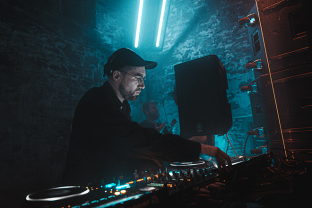Publicly funded Berlin music institution and event accused of discriminatory practices
The Berlin Music Commission and the Most Wanted: Music event series it organises have been accused of discriminatory practices

The Berlin Music Commission and the Most Wanted: Music event series it organises have been accused of discriminatory practices that fail to meet the transparent, democratic and inclusive processes required of institutions that receive public funding.
Four individuals have spoken to Mixmag about their experiences working with the BMC and MW:M, sharing testimonies of tokenisation, gaslighting, erasure, exploitation, a hostile working environment, and improper meditation of reported issues.
The BMC receives funding from the Senate of Berlin, as well as private donors such as music companies. MW:M is its flagship annual event that also receives funding, sponsorship and ticket sales.
Nadia Says was employed on a freelance basis by the Berlin Music Commission to work on the 2019 and 2020 editions of Most Wanted: Music conference, with among other job goals, improving diversity.
At the 2018 edition that Nadia Says did not work on, there were 37 female/non-male speakers and three POC/non-white speakers. For 2020, the number of POC/non-white speakers had grown nearly 10 times larger with 29 appearing, and the number of female/non-male speakers had risen to 53.
During her time working on the conference, Nadia observed issues within the project that she did not view as in-keeping with her job goals and communicated these to management, with the support of Matthias Jung, the Head Of Contents at the time who initiated her hiring. However she felt her assessments were not taken seriously and were disregarded, which was exacerbated when Jung, who had been supportive, left the project in summer 2020.
One example of this is Nadia’s work on the project being erased, by actions such as an anti-racism talk she gave for the BMC being made private on SoundCloud after she criticised MW:M20 for not addressing anti-Muslim issues within its program, and not being featured in the MW:M19 recap video despite hosting a stage for two full days.
These experiences gave Nadia the impression that the mutually agreed goals of her job were not backed up by the management of Most Wanted: Music, and that she had been hired tokenistically in order for the event to make it look like it was taking diversity seriously without committing properly to taking action.
This impression, as well as not wanting to contribute to discriminatory structures, led Nadia to cancel her own stage appearance in 2020. A clarifying discussion was held with the BMC on January 19, 2021, at which representatives of the Anti-Discrimination Network Berlin of the TBB (ADNB), Barbara Gande and Nilgün Çakan, were present.
While Nadia was reporting her observations of discrimination on the call, the conversation got heated, and the ADNB representatives noted several occurrences where the BMC might have been in breach of the General Equal Treatment Act (AGG). Barbara Gande says: “Employers are obliged to take the necessary and precautionary measures against discrimination and they have to inform their employees about the AGG. In order to make the concept of diversity work in the long term it has to go hand in hand with antidiscrimination laws to provide the necessary prevention and protection for employees and self-employed persons.”
Following this experience, Nadia Says would like to see the BMC listen, take responsibility, offer reparation and implement structural changes, such as a review of its hiring process to meet the legal and quality standards required when spending public money, in order to promote authentic inclusion within the institution.
In a statement sent to Mixmag, Nadia Says says: “Working with MW:M was primarily an investment in the music community from my side as the financial compensation was very low, but I believed they were open to becoming inclusive. It then turned into a proper job and I was very happy to help build a community-driven platform, until I realised the inclusion some colleagues and I were trying to implement could not take root given the systemic issues that all boiled down to a lack of diversity and awareness in MW:M and the BMC power structures. I was deeply hurt by the actions of these two organisations, and I witnessed other people being hurt too, however I still believe positive change can happen as soon as MW:M and the BMC can genuinely accept diversity and inclusion as core values and give a seat at the table to all of Berlin's fantastic music communities in full transparency and without restrictions.”
Thor Hagedorn, who works on the board of trustees of the BMC, also spoke to Mixmag about allegations of structural racism in several projects including the listen to berlin: Awards at Most Wanted: Music, and sexism, tokenisation, exploitation and microaggressions while working on Zukunftsmusik (‘Music of the Future’ project administered by the BMC) that pairs young creatives to be mentored by experienced professionals.
Among the problems he encountered, Thor says he was ready to help MW:M21 sourcing speakers until he was told how low fees were. He also accused BMC’s poster project Zukunftsmusik of using “trending phrases” such as ‘immigrant background’ in relation to the young mentees of the project to help secure funding then failing to hire an adequately racially and gender diverse selection of paid mentors.
Thor also says he had to strongly push back against music experts chosen by BMC who minimised the pioneering role Black people and culture had on electronic music past and present. His efforts, together with Christine S., resulted in a Black collective being nominated for the listen to berlin: Awards; the collective then won the award, with an accompanying press release from Most Wanted: Music saying the conference is committed to “amplifying BIPOC voices”. In the same week, two POC speakers resigned from featuring at the event.
One of those speakers, regular Mixmag contributor Marcus Barnes, spoke about his decision, saying: “I don't want to be associated with an organisation like this and I'm certainly not willing to be hired to boost their veneer of 'diversity'.”
Mixmag also spoke to two speakers who cancelled their planned appearance at MW:M 2020, Monty Luke and Melissa Taylor of Tailored Communication, who said: “I stand by all our decisions and think it was the right thing to do, also as it demonstrates to others in the industry that it's important to live by your ethics and be able to say no to things that do not align with your values.”
Christine S. also worked on the Project Zukunftsmusik managed by the BMC and alleges she faced tokenism, erasure, sexism, nondemocratic leadership and exploitation during this time.
Christine was brought into Zukunftsmusik in a mentor role alongside at least one other person of colour, but once the project received funding both Christine and another POC mentor were officially removed — Christine was kept on in the role ‘unofficially’, while all the officially appointed mentors charged with leading the project were white men.
Examples of discrimination include being labelled as “emotional” and a “diva” when speaking up about opinions, and not having ideas listened to unless communicated through a male colleague. When trying to speak for herself, Christine says she was told "einfach mal auf dem Teppich bleiben, bitte", which can be translated as “stay in your lane, please”.
Christine explains a request for mediation to discuss her issues working on the project was improperly treated. A BMC staff member leaked Christine’s confidential communication that explained the situation and asked for their support to a Zukunftsmusik problematic organizer, and they hired a white mediator - who admitted not to have any expertise in anti-racism/discrimination in the work place. When Christine requested a reputable anti-discrimination mediator, who is Black, BMC and Zukunftsmusik were unwilling to comply with the mediation.
Speaking about action she would like to see BMC take in response, Christine says: “In order for the Berlin Music Commission to successfully promote cultural sustainability within its work culture and network, they need to actively and openly hold themselves accountable for their participation in intersectionally discriminatory practices and invest in methods to reconcile and ensure equitable change. Workers of BMC who have experienced discrimination and were dismissed or forced to leave their positions under their management or leadership should be compensated and given the option to re-enter their positions with suitable and fair conditions.
“BMC should refrain from tokenism advertising and commit to a 50% BIPOC and FLINT* representation quota for permanent leadership positions within the organization.
“[BMC should also] encourage a culturally diverse work environment and safe internal dynamics by investing in recurring mandatory intensive anti-racism, anti-bias training.”
Achan Malonda also worked with the BMC in various roles, and says that despite enjoying working with them and profiting from the work, she also observed systemic issues within the organisation which she attempted to communicate to the board to encourage anti-racism and diversity, but has found them unwilling to address these issues.
Speaking to Mixmag, Achan said: “The BMC needs to make a serious effort to have better representation of marginalized groups inside the network. Gaining members like Ho__mies, fæmm, Transmission.net or Queer Ear Mastering would be an important step. Of course that depends on creating the conditions to make a membership attractive for such actors. Above all that means making the BMC a safer space for them. This has to start with the organization itself.
“There is no neutral position to be taken on the question of discriminating structures. Everybody is in favour of ‘more diversity’, but like many ventures the BMC suffers from structural problems: not just racism, but every form of representation and participation in the front office and committees.
“It's good that there's already been a workshop with the Berlin agency misc and I also hear that people try to staff juries and line-ups as diverse as possible. The organization has appointed its own Diversity Officer now. But of course delegating this issue to a single person doesn't solve this all-encompassing problem, there needs to be additional resources and a whole team behind them. This can only be the beginning of a long and thorough process of continuously assessing and shaping the organization's structure and development.
“I can only hope that one day it will be normal that such feedback will be received with gratitude and that marginalized people can organically leave behind their role as tokens.”
Alongside the scheduled speakers quoted earlier in this article who cancelled their appearances at MW:M21, one of the speakers who was present at the event held at Kulturbrauerei (pictured), musician and author David Mayonga aka Roger Rekless, has since stated he would have pulled out if the accusations against MW:M had not been kept from him — unless those making accusations against MW:M were allowed to speak at the event.
Mayonga says: “I looked into the MW:M before we went there, and saw that they apparently tried to focus on diversity and had people like Achan Malonda on their roster. That convinced me. But after the event I learned from BIPoC, most of them women, who had worked with MW:M that they had experienced racist behaviour and discrimination.
“I was happy that we had the chance to talk about racism in the music industry at our live talk; but had I known what had happened the year before I would have wanted those people as paid speakers as part of the event so they could share their experiences too - because that's exactly the sort of thing we should be talking about. And if this hadn't been possible I would not have taken part in the event.”
During another talk at Most Wanted: Music’s 2021 edition, Black Artist Database’s Christine Kakaire responded to a question about strategies for amplifying Black voices in the music industry with an answer detailing the need to interrogate where the power is held in “institutions like this, like Most Wanted, or Berlin Music Commission”.
Christine Kakaire said: “If equity is truly the goal, we wouldn’t be fretting over amplification, over diversity, over inclusion. If we are interrogating where the power is held in these institutions — even institutions like this, like Most Wanted, or Berlin Music Commission — if we are interrogating who holds the power in these situations then we’re moving towards equity. If we’re fretting over the language of things like diversity, inclusion and amplification, we’re just becoming completely distracted by the optics of performance and that’s not what I’m here for.”
In Berlin Music Commision’s newsletter recap, this quote was abridged, with reference to MW:W and BMC cut out, to: “I hope people go away and are not distracted by performative messages, but what are the actions taking place – that’s where the change happens.” The abridged version of the quote, which criticised using language such as ‘diversity’ without interrogating power structures, was also shared on Twitter alongside the hashtag #Diversity.
Nadia Says has also shared criticism of MW:M for a lack of open communication to guest speakers and her hopes for a more transparent approach for future editions, saying: “Using diversity and inclusion to create attractive marketing and content while not being open with concerned speakers about on-going discrimination issues and while not actively working on eradicating these issues is hugely problematic. Already in 2020, MW:M was reluctant to face these problems and to inform speakers openly and directly; it is sad to see that 2021 was no different and several speakers did not get key information to decide whether to take part in the event or not. I really hope 2022 will be the year MW:M approach diverse speakers honestly and offer a transparent and democratic platform for important debates.”
Mixmag approached the Berlin Music Commission and Most Wanted: Music for a response to the allegations in this article and was went the following statement from the BMC:
"Discrimination and unequal treatment are a major problem in many parts of social life worldwide. Unfortunately, the music industry is not exempt from this either. The Berlin Music Commission devotes all its energy to improve this situation.
We have been committed to more diversity, equal opportunities, gender balance and against any form of racism and discrimination for many years. Therefore, we were honestly surprised and very much affected by the accusations against us [which have been raised by multiple people over the past couple of years - editorial note]. However, in the course of our intensive investigation with the facts we realized that there was indeed a need for action on our side. We have subsequently taken a number of actions.
We comment on the points you have raised as follows:
1.The Board of Directors and the Supervisory Board of the Berlin Music Commission have investigated all allegations in detail.
2. A detailed statement was made on the allegations raised against the Berlin Music Commission and individual members of its staff in a discrimination complaint by the Anti-Discrimination Network Berlin of the Turkish Federation in Berlin-Brandenburg. We beleive this process revealed that there has been no foundation on labor or civil law for the accusations made against the BMC.
We ask you to examine the matter in detail before publishing your article and for an objective presentation of the facts."
Mixmag received these documents and has examined translations into the English language. Across the lengthy documents - which all relate to the dispute between the BMC, and Nadia Says assisted by the ADNB - there are two sections relating to allegations referenced in this article. The first refers to the removal of a talk by Nadia Says from the BMC's public SoundCloud, which BMC argues they had justifiable ground to do. The second refers to the “clarifying discussion” between BMC on Nadia Says with ADNB representatives present on January 19, 2021, which offers an apology for an alleged ‘sharp tone’ taken by a BMC representative, but denies the emotional response can be seen as a direct disciplinary measure or act of discrimination, as claimed by the ADNB.
The BMC statement continues:
"3. We strive to achieve a balance and representation of as many social groups as possible, both among our staff and among the participants in our events.
- For example, there are currently 5 female and 2 male permanent employees at the Berlin Music Commission office.
- In 2021, the project team for our events Most Wanted: Music, MW:M Live and listen to berlin: Awards consisted of 14 female and 10 male freelancers, including 3 POC and 7 people with a migration background.
- Of the speakers and experts who participated in the 2021 Most Wanted: Music conference and whose corresponding data is available to us, 57.3% were not male.
- In 2021, 15% of the speakers at Most Wanted: Music were POC.
- 21.5% of the speakers do not live in Germany.
- Since 2018, Most Wanted: Music has been an associated event of Keychange. Keychange is an initiative for gender equality in the music industry and event world. It aims to achieve a balanced proportion (50:50) of performances by female and non-female artists and speakers at music festivals and music conferences by 2022. Most Wanted: Music has been achieving this ratio since 2019.
- At the listen to berlin: Awards 2021, one of two presenters was a POC woman, as it was in previous years.
- Half of the laudators were women, one of them POC.
- The majority of the award winners are women (8 out of 13), four of whom are POC.
4. These figures are a first partial success. However, we will work tirelessly to improve it further. In addition to these results, we have taken further action in dealing with the issue. Here is a selection:
- We make grievances in the industry clear by repeatedly pointing out the problems at our events and discussing them with protagonists from all sides in public workshops, lectures and discussion rounds.
- On the other hand, we are proactively working on change within our own organisation. Thus, we have permanently installed the position of a Discrimination Officer in the BMC head office since 2021.
- Furthermore, we have developed a detailed Code of Conduct together with our members, which serves as a guideline fair and non-discriminatory behavior for all employees and members of our network.
- The staff of the BMC head office have undergone diversity training [consisting of a workshop, and attending diversity-themed events such as a keynote or diversity talks]
- We offer further education for the actors and entrepreneurs of the Berlin music industry on the topic of diversity and anti-discrimination. The next one is going to happen today on Thursday 24th February 2022.
- Also our program reflects our efforts to deal with the topic [12 examples have been provided to Mixmag, including #HowWeListen - Discovering Music from Underrepresented Communities; Amplifying BIPOC Voices in the Music Industry; and musicBwomen* x music is her passion e.V.] We will continue to pursue and expand the topic this year.
From these selected figures, we hope you can see that equal treatment and balance among all different social groups are key elements of our work.
We know that the fight against discrimination and everyday racism is a difficult and lengthy process that we will only win all together. We are aware that this challenge takes time, from raising awareness to implementation at all levels. This is what we are working on with full force.
We ask for nothing more than recognition of our efforts, for support and for the chance to also improve ourselves further in this.
Yours sincerely,
Sören Birke, Chairman of the Supervisory Board
Stephan Hengst, Director Most Wantes: Music
Olaf Kretschmar, Chairman of the Board of Directors
Rosita Kürbis, Member of the Supervisory Board".
Update 25/02: A follow-up statement has been sent to Mixmag by Achan Malonda is response to the BMC, stating: "Sadly this statement is exactly proving our point and shows that the relevant dimensions of diversity, meaning more than just quotas for PoC and women, are not not really understood. Quotas have to be approached intersectionally and not just focused on one mode of discrimination (there are more than two by the way!), because that could very well lead to just checking boxes without understanding how their intersection might affect power structures.
BMC, like most organisations on their quest for "diversity", want to be lauded for their efforts but they're not being honest about what those efforts have actually looked like and led to. For example they state that 15% of the speakers at Most Wanted: Music 2021 were PoC without acknowledging that that means that naturally 85% were white. Other forms of marginalization like those experienced by trans people or people with disability don’t even occur to them.
Beyond that, mere representation is not enough, a shift of power distribution has to happen. The fact that this statement was signed by three white cis men and one white cis woman, all occupying key positions in the org, is the clearest possible symbol for what that power distribution currently is."
This article was updated on 25/02 after additional fact checking
[Photo: Mihael Grmek]
Patrick Hinton is Mixmag's Digital Editor, follow him on Twitter

Mixmag will use the information you provide to send you the Mixmag newsletter using Mailchimp as our marketing platform. You can change your mind at any time by clicking the unsubscribe link in the footer of any email you receive from us. By clicking sign me up you agree that we may process your information in accordance with our privacy policy. Learn more about Mailchimp's privacy practices here.

 Bugged Out Weekender to return to Bognor Regis in 2026
Bugged Out Weekender to return to Bognor Regis in 2026













